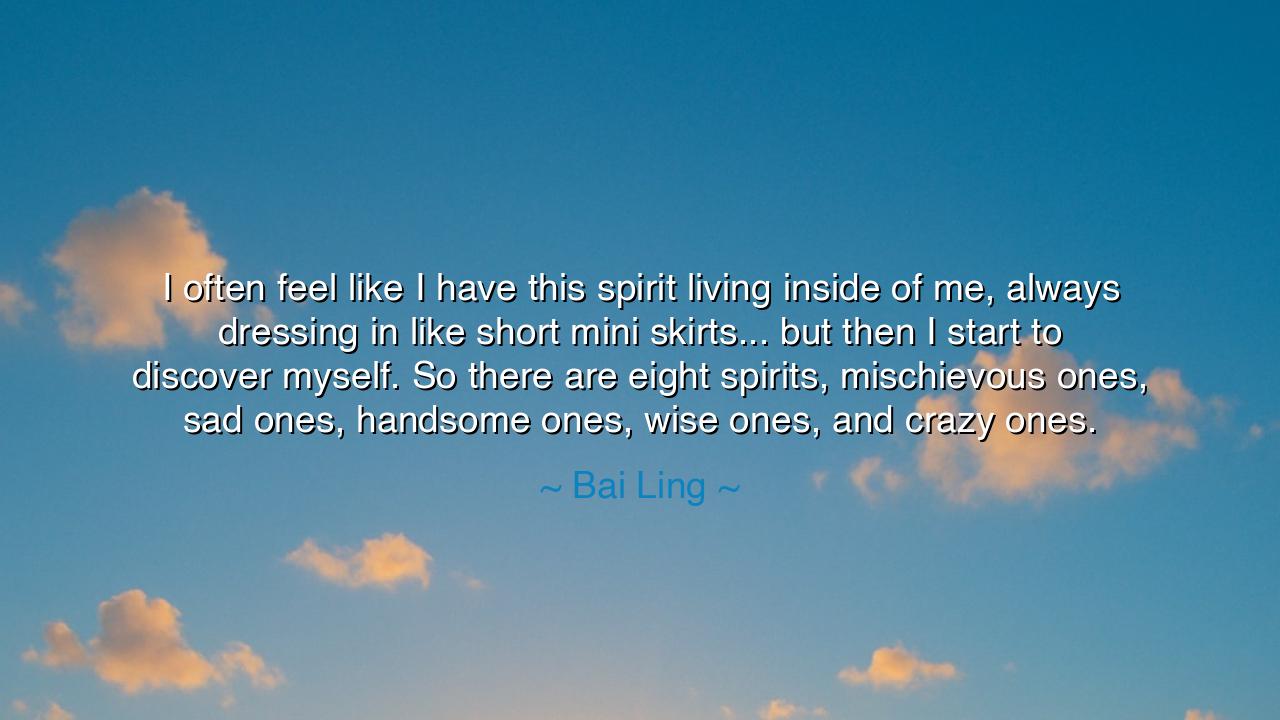
I often feel like I have this spirit living inside of me, always
I often feel like I have this spirit living inside of me, always dressing in like short mini skirts... but then I start to discover myself. So there are eight spirits, mischievous ones, sad ones, handsome ones, wise ones, and crazy ones.






Hear the words of Bai Ling, who opened her soul with mystery and fire: “I often feel like I have this spirit living inside of me, always dressing in short mini skirts... but then I start to discover myself. So there are eight spirits, mischievous ones, sad ones, handsome ones, wise ones, and crazy ones.” At first her words may appear whimsical, yet they are a doorway into the oldest truths—that the self is not one voice but many, and that within each of us dwells a chorus of spirits shaping who we are.
The ancients spoke often of this. The Greeks told of the daimon, an inner guide or spirit that dwelt within each man and woman, shaping destiny and desire. Socrates himself confessed that a spirit whispered warnings in his ear, guiding his path. In Bai Ling’s confession of her eight spirits, we hear the same ancient echo: the recognition that the soul is not simple, but manifold, filled with forces both playful and solemn, both light and shadow.
The mischievous spirit delights in chaos, urging us toward freedom, laughter, and rebellion. The sad spirit reminds us of sorrow, teaching empathy and humility. The handsome spirit calls us to beauty, to charm, to the appreciation of form. The wise spirit whispers counsel in times of confusion, and the crazy spirit reminds us that sometimes joy is found in breaking reason’s cage. To deny any of them is to live only half a life; to embrace them is to live as a full and complex being.
History itself offers mirrors of these spirits. Consider Joan of Arc, who heard voices from heaven urging her to battle—were these not her spirits, both heroic and divine, guiding her toward destiny? Or think of the poet Rumi, who spoke of the soul as a host of guests: joy, sorrow, madness, wisdom—all knocking upon the door, all to be welcomed. So too, Bai Ling names her visitors, her companions, her inner host of selves. In her confession lies wisdom disguised in strangeness.
The origin of this truth lies in our shared humanity. From the child who plays in mischief, to the elder who counsels with wisdom, all the stages of life remain within us, never lost. They rise and fall in seasons, some dominant, some quiet, but all alive. To “discover oneself,” as Bai Ling declares, is not to choose only one spirit, but to recognize the eight—or the eighty—that live within, and to grant them their rightful place in shaping the soul.
The lesson is clear: do not deny the multiplicity within you. Do not be ashamed if some days you are wise and others foolish, some days joyful and others sorrowful. This is the nature of being human—to be many things at once, to hold contradictions, to be at times radiant, at times broken, and yet whole. To embrace your spirits is to embrace your humanity. To suppress them is to live as a shadow of yourself.
Therefore, let all who hear take this counsel: when you feel the pull of mischief, know it is part of you; when you feel the weight of sadness, honor it as a teacher; when wisdom whispers, heed it; when madness laughs, let it dance, but do not let it rule. For life is not the silence of one spirit, but the symphony of many. Walk proudly with your inner host, for in their mingling you discover your truest self.
Thus the teaching endures: within every heart there lives not one spirit but many, and to know oneself is to learn their names. Bai Ling’s eight spirits are but a reflection of us all. Accept them, honor them, and live fully, for in their harmony lies the music of the human soul.






AAdministratorAdministrator
Welcome, honored guests. Please leave a comment, we will respond soon